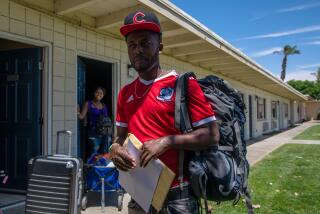Boy So Close--and Now So Far From Parents and Siblings
- Share via
STANKOVAC, Macedonia — He had spent 12 agonizing days as a child all alone in a refugee camp, and Friday was supposed to be the happy day when Mentor Hoti was reunited with his family.
Early in the week, Mentor, 14, had learned that his parents and siblings were in a neighboring camp, not much more than a mile away. After the bureaucratic obstacles were finally cleared, on Friday afternoon he climbed into the back of a Red Cross vehicle for the short ride back to his family.
For more than an hour, Red Cross representatives used a megaphone to try to locate his parents in the sprawling camp, but no one responded. Then a woman hurried up to the vehicle and said the Hotis had left for Germany two days earlier.
Mentor choked back tears when he heard the news. Then he stopped resisting, sunk his head into his chest and cried over the latest of many devastating disappointments he has suffered in the 2 1/2 weeks since Serbian forces kicked him and his family out of their home and their village in Kosovo.
In a cruel twist of fate, Mentor and his family lived in neighboring camps for 10 days, but the organizational mayhem in camps kept them from discovering each other’s whereabouts. And then red tape from Macedonian authorities and the soldiers posted at the two camps’ gates kept them apart--until it was too late.
On Wednesday, Mentor’s parents and siblings boarded an evacuation flight to Germany. It appears that while Mentor knew they were in the Stankovac camp two days before they left, his parents were unaware that Red Cross representatives had located their youngest son and were striving to reunite the family.
“His parents were so worried about him that they didn’t sleep. They searched every tent,” said Mihrije Pllana-Hoti, 37, a distant relative. “They couldn’t find him, so they decided to go.”
Representatives from the International Committee of the Red Cross who had been trying to reunite the family said that, in time, they will locate Mentor’s family, clear all the necessary legal obstacles and send him to be with them.
“He will definitely be reunited with his parents in Germany,” said Francois Zen Ruffinen, spokesman for the Red Cross in Macedonia. “I just can’t tell you when.”
Mentor is one of thousands of children who the Red Cross believes have been separated from their parents as Serbian forces expelled hundreds of thousands of ethnic Albanians from Kosovo during the last three weeks.
In Mentor’s case, he had become separated from his family on the Macedonian side of the border, where tens of thousands of refugees were forced to languish for days in a muddy valley while Macedonian authorities grappled with what to do with the ethnic Albanians who had inundated their tiny country.
When a little girl fainted, Mentor carried her out of the crowd to seek medical help. But when he turned to rejoin his family, a Macedonian guard blocked him and put him on a bus to the Brazda refugee camp about 10 miles from the border.
That was the first of many days and nights full of anxiety and tears for Mentor.
A typical young teen, Mentor has a little peach fuzz on his upper lip, is awkward and shy around grown-ups and replies to most questions with one-word answers. Unlike most camp dwellers, who complained bitterly about not having a shower in more than two weeks, Mentor said he didn’t mind because he doesn’t like baths much anyway.
Mentor’s first several days in camp were the worst. He sobbed frequently. Several times he mentioned his fear that his parents would go to another country without him.
Then, earlier this week, things seemed to be getting a little better. He made friends with some boys his age who lived in and around his tent. He learned that his parents were nearby and was told he would soon be with them.
And he enjoyed participating in the children’s demonstrations at the camp. With scores of other children, he marched around the camp, chanting, “NATO! NATO!” or, referring to Yugoslav President Slobodan Milosevic, who has waged a war against ethnic Albanian separatists: “Slobodan, we are not terrorists!”
“It’s a demonstration for NATO ground troops,” a cheery Mentor said Wednesday, explaining why he was running around the camp and shouting with the other children. “We want them to come.”
But his smile quickly melted as he thought about Kosovo.
“I’m worried for all the people staying in the woods without food and water,” he said, breaking into tears of rage. “I’m very angry at Serbs.”
But he quickly shook off the tears and said he was “very happy” because he had been told that he should show up at the Red Cross tent Thursday at 10 a.m so he could be reunited with his family.
So, tense but excited, Mentor walked to the Red Cross tent at 10 a.m. Thursday with all his belongings--the clothes on his back. He was spoken to gruffly and told to return at 3 p.m.
When he returned at 3, he was again rebuffed and told to report again Friday at noon.
“We were expecting to get a green light today, but we didn’t,” said Christina Robiez, a Red Cross official working on reunifying children with their families. She complained that Macedonian officials were complicating the process of unifying families by failing to give the go-ahead.
“It’s very frustrating,” she said. “We have children waiting.”
Visibly disappointed, Mentor returned to the tent he shared with about a dozen other people.
But as the midday sun beat down on the camp Friday, Mentor was full of anticipation. He joked with some young pals that he’d rather stay with them than rejoin his family. Three of his new friends accompanied him to the Red Cross tent to say goodbye.
For two hours the boys waited. They teased each other about girls, a little. But mostly they just waited in nervous silence.
Finally a Red Cross vehicle was ready to take Mentor and two other refugees to Stankovac for family reunions. He climbed into the back of a white Land-Rover with a young girl and an older woman.
Mentor’s face brightened as the vehicle parked at Stankovac. Mentor and the girl jumped out expectantly. The girl was immediately swept up by her family. Mentor’s eyes scanned the clusters of people around, but he saw no one familiar. Tension tightened his face.
Then everyone piled back into the vehicle to begin a painstaking effort of trying to locate the families of Mentor and Emine Dobrodolli, 62, in the huge camp that houses at least 8,000 people in dark green, mustard yellow and cream canvas tents.
Dobrodolli, who wore a scarf around her head and a long skirt, tried to make friends with Mentor.
“The two of us haven’t found our families yet, have we?” she said, touching Mentor’s knee in a kind gesture.
With a megaphone in hand, Red Cross workers walked and then drove through the hilly camp, announcing that they were searching for the families of the woman and the teenager.
After what already seemed like a long time, a chubby boy ran up to claim Dobrodolli, and her 60-year-old sister was not far behind. As Dobrodolli climbed out of the vehicle and exchanged hugs with her sister, Mentor watched the reunion from the Land-Rover, tears rolling down his face.
The search continued for Mentor’s family. Then the young woman approached the Land-Rover and said something about the Hotis going to Germany.
“In a way, I’d be happy if they left for Germany because my brother is there,” said Mentor, putting on a brave front.
Then came the confirmation. At the most congested area of the camp, Mentor’s distant relative heard the announcement and rushed to the vehicle with the bad news.
As the Red Cross representatives tried to figure out what to do with him, the news sunk in, and tears again wetted Mentor’s cheeks.
*
Many charities are accepting contributions to help refugees from Kosovo. The list may be found at https://www.latimes.com/kosovoaid.
Young and Alone
Mentor Hoti, 14, and his family were forced from their Kosovo home shortly after NATO launched its airstrikes March 24. After a week of waiting to cross the Macedonian border, he was separated from his family when he stopped to help a girl who had fainted. For previous reports on him, see The Times’ Web site at https://www.latimes.com/yugo.
More to Read
Sign up for Essential California
The most important California stories and recommendations in your inbox every morning.
You may occasionally receive promotional content from the Los Angeles Times.













